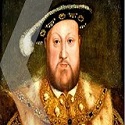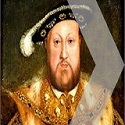Henry VIII, the Reign
Timeline 1537
Great Council Called
26 January 1537
In the wake of the Pilgrimage of Grace, a Great Council is called, which is an extra parliamentary assembly of nobles, higher clergy and selected local dignitaries, and over the following months fresh rounds of doctrinal discussion took place to remedy the evident inadequacy of the ten articles.
In the wake of the Pilgrimage of Grace, a Great Council is called, which is an extra parliamentary assembly of nobles, higher clergy and selected local dignitaries, and over the following months fresh rounds of doctrinal discussion took place to remedy the evident inadequacy of the ten articles.
First Synod of the English Church
17 and 18 February 1537
First synod of the Church of England called by Cromwell; previous religious councils in England had been called by papal legates. It opens in Parliament House.
First synod of the Church of England called by Cromwell; previous religious councils in England had been called by papal legates. It opens in Parliament House.
Sacraments Row
Synod began with a fierce row over the number of sacraments – four of the medieval seven were excluded from the Ten Articles the previous summer.
Hamburg Sailor Arrived
March 1537
A pamphlet is written in Germany and sent via an anonymous sailor out of Hamburg in July to encourage a rekindling of Anglo–Schmalkaldic relations. Henry was displeased by the manner in which it had been sent.
A pamphlet is written in Germany and sent via an anonymous sailor out of Hamburg in July to encourage a rekindling of Anglo–Schmalkaldic relations. Henry was displeased by the manner in which it had been sent.
Reginald Pole against Henry VIII
Reginald Pole travelled slowly, constantly worried about money, leaving Rome on 18 February 1537 and reaching Lyons only on 24 March. The encouragement of a bull of 31 March 1537, granting a crusading indulgence to anyone who undertook to overthrow Henry by force, did not make him move much faster. When Pole finally reached Paris on 10 April, Francois I expelled him because of treaty obligations to Henry.
Synod in Committee
Meetings of the synod continued but as smaller, less formal committees probably at Lambeth Palace or episcopal lodgings. Cromwell left Cranmer the chairmanship, and the meetings were co¬ordinated by the evangelists Cranmer and Foxe.
Schmalkalden
The English evangelists send, seemingly unknown to the king, a Thomas Theobald, who was a godson of Anne Boleyn's father and probably at some time vicar of Kemsing & Seal, Kent.
The Bishops’ Book Ready for Publication
September/October 1537
The Institution of the Christian Man – also called The Bishops' Book – was complete and signed by forty-six divines, headed by Thomas Cranmer. The detailed work was intended to be the official formulary of the reformed Anglican faith in England.
The Institution of the Christian Man – also called The Bishops' Book – was complete and signed by forty-six divines, headed by Thomas Cranmer. The detailed work was intended to be the official formulary of the reformed Anglican faith in England.
Edward Born
12 October 1537
Jane Seymour, Henry's third wife, gives birth to a boy – Prince Edward.
Jane Seymour, Henry's third wife, gives birth to a boy – Prince Edward.
But Henry has not Read the Book.
Henry VIII’s response to The Bishops’ Book was that he had not got round to reading the whole volume yet.
Jane’s Brother is now Earl Seymour
18 October 1537
Jane’s brother, Edward Seymour, is made Earl of Hertford.
Jane’s brother, Edward Seymour, is made Earl of Hertford.
Jane Dead
24 October 1537
Jane died as a result of birth complications.
Jane died as a result of birth complications.
King's Ear for Evangelical Bishops
Letter sent from Strasburg reporting on Theobald’s arrival began, ‘To day a man from England was here, who brought to our preacher a letter in which was written that as a result of the recent uproar in England [Pilgrimage of Grace] the evangelical bishops very much have the king’s ear and that from day to day there is good hope of furthering the cause of the gospel in England.’
Cunning Foxe
The letter also said that Bishop Foxe recommends that the League send an embassy to England or at least send a letter. However, this is a private initiative on behalf of the evangelicals and Edward Foxe’s involvement must be kept secret 'so that he does not come into any danger with his lord the king.’
First Surrender of the Larger Monasteries at Lewes
16 November 1537
Layton had previously reported to Cromwell:-
At Lewes I found corruption of both sorts, and what is worse, treason, for the sub prior hath confessed to me treason in his preaching. I have caused him to subscribe his name to it and to submit himself to the king's mercy. I made him confess that the prior knew of it and I have declared the prior to be perjured. That done, I laid unto him concealment of treason, called him heinous traitor in the worst names I could devise, he all the time kneeling and making intercession unto me not to utter to you the premises for his undoing; whose words I smally regarded, and commanded him to appear before you at the court on All Hallows Day, wherever the king should happen to be, and bring with him his sub prior. When I come to you I will declare this tragedy to you at large, so that it shall be in your power to do with him what you list.
On 16 November 1537 the priory was surrendered and all its lands were granted to Thomas Cromwell.
Layton had previously reported to Cromwell:-
At Lewes I found corruption of both sorts, and what is worse, treason, for the sub prior hath confessed to me treason in his preaching. I have caused him to subscribe his name to it and to submit himself to the king's mercy. I made him confess that the prior knew of it and I have declared the prior to be perjured. That done, I laid unto him concealment of treason, called him heinous traitor in the worst names I could devise, he all the time kneeling and making intercession unto me not to utter to you the premises for his undoing; whose words I smally regarded, and commanded him to appear before you at the court on All Hallows Day, wherever the king should happen to be, and bring with him his sub prior. When I come to you I will declare this tragedy to you at large, so that it shall be in your power to do with him what you list.
On 16 November 1537 the priory was surrendered and all its lands were granted to Thomas Cromwell.


